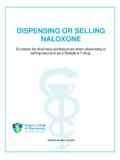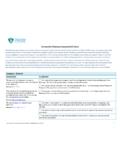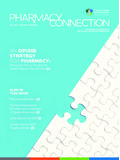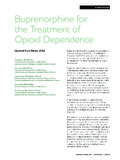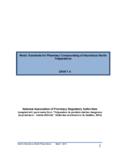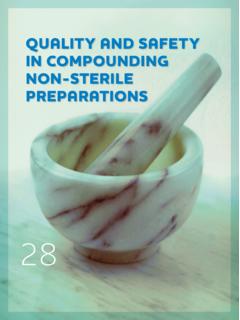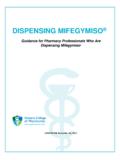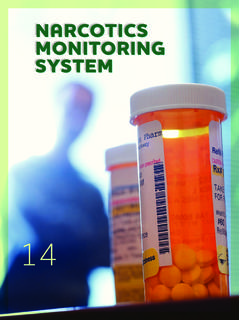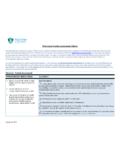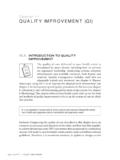Transcription of ISMP CANADA CONTINUOUS QUALITY …
1 ISMP CANADA . CONTINUOUS QUALITY . IMPROVEMENT (CQI): An Essential Constituent of Patient/Medication Safety INTRODUCTION: In September 2016, the Institute Mi Qi (Maggie) Liu, PharmD for Safe Medication Practices Student1,2 CURRENT LANDSCAPE CANADA (ISMP CANADA ) and the OF CQI IN ONTARIO Leslie Dan Faculty of Pharmacy Janice Law, BSc, PharmD Student3 at the University of Toronto In 2015, the Ontario College collaboratively conducted a Certina Ho, RPh, BScPhm, MISt, of Pharmacists (OCP) published research survey, in an effort to MEd, PhD1,2,3. an article entitled CQI Benefits explore and gain better insight Patients in Community Pharmacies into the current perceptions in Pharmacy Connection,1 and implementation of CQI. Institute for Safe Medication 1 . highlighting the need for programs in Ontario community Practices CANADA CONTINUOUS QUALITY improvement pharmacies. A 28-item online School of Pharmacy, University of 2 (CQI) and expecting CQI program questionnaire was sent to Waterloo adoption by community pharmacies Ontario community pharmacists in Furthermore, as and pharmacy technicians Leslie Dan Faculty of Pharmacy, 3.
2 Per the standards of practice who provided consent to OCP. University of Toronto for the pharmacy profession, to be contacted for research all pharmacists and pharmacy purposes during their annual technicians have the responsibility registration. The questionnaire and obligation to manage aimed to identify pharmacy medication incidents and address professionals' perceptions about unsafe Despite the CQI and the current extent of potential significant benefits CQI implementation, as well as associated with CQI programs, perceived enablers and barriers to to-date, the only Canadian province implementing a CQI program. that has successfully implemented a mandatory standardized community A total of 299 responses were pharmacy CQI program and collected and analyzed. Overall, reporting of medication errors is pharmacy professionals have Nova Scotia. positive perceptions of CQI. programs and the associated benefits to patient care and safety.
3 However, the dominant concern with discussing and reporting medication incidents is associated with a perceived blame-and-shame culture in community pharmacy. With respect to CQI program implementation, time is considered to be the greatest challenge. In PAGE 30 ~ WINTER 2017 ~ PHARMACY CONNECTION. ISMP CANADA . addition, responses suggested that P. rompt communication and proactively identifying areas of there is currently a large variance sharing of medication incident improvement and monitoring in the stage of implementation of details (including contributing progress of the resulting CQI programs across community factors and immediate action enhancement or action plans pharmacies. For pharmacies plan towards the incident) among at regular CQI or staff meetings that have not implemented a pharmacy team members; at the pharmacy. An example CQI program, or have partially of this resource is the ISMP. implemented one, the barriers T.
4 Rending and/or identification CANADA Medication Safety Self- to implementation cited included of common medication Assessment for Community/. challenges in allocating adequate incidents occurring in pharmacy Ambulatory Pharmacy , available human resources to facilitate a practice and corresponding at CQI program and incorporation recommendations of changes amssa/.5. of CQI requirements into daily for prevention of incident operations. The great variation reoccurrence; and WHAT IS A. in these responses implied that MEDICATION INCIDENT? community pharmacies are P. otential increase in staff currently at different stages with engagement with a no-blame- A medication incident is any respect to implementation of a CQI no-shame culture of patient preventable event that may program, which may be interpreted safety. cause or lead to inappropriate as a lack of standardization in CQI medication use or patient implementation and processes.
5 The typical components of a harm while the medication is in standardized or formal CQI the control of the healthcare WHY DO WE NEED CQI? WHAT IS A program include (but are not professional, patient or consumer. 6. STANDARDIZED CQI PROGRAM? limited to) the following:3 Medication incidents can occur at any stage of the medication-use CONTINUOUS QUALITY improvement A. nonymous reporting of process ( prescribing, order (CQI) involves an ongoing and medication incidents to entry, prescription preparation systematic examination of an an independent, objective / dispensing, administration, organization's work processes third-party organization that and monitoring). Common and the employment of scientific has the relevant expertise in types of medication incidents methods to identify and address medication incident analyses include incorrect drug, incorrect the root causes of QUALITY issues and commitment to sharing dose, incorrect frequency of and implement corresponding learning that is derived from administration, improper storage of The benefits of CQI trends and patterns of medication medication, incorrect quantity, etc.
6 Can be enormous from an incidents reported by pharmacy These also include near misses ( organizational management point professionals. An example of this an event that could have resulted of view, by regularly and systemically resource is the ISMP CANADA in unwanted consequences, but examining, monitoring, and Community Pharmacy Incident did not because either by chance improving core pharmacy workflow Reporting (CPhIR) program, or through timely intervention and processes, we can potentially available at [that] the event did not reach the eliminate sources of inefficiencies, patient )6 and no harm events ( suboptimal QUALITY of care and A. n open discussion on an incident occurs and reaches the services to patients, and enhance medication incidents and patient, but results in no harm to the overall system their associated root causes the patient, for example, events among pharmacy team where the medication has been We learned from responses to members, followed by formal dispensed and may have been our recently administered CQI documentation of QUALITY consumed by the patient, but the questionnaire (see above) that improvements made as a result patient presents no symptoms or Ontario community pharmacies of regular incident reviews during does not require treatment).
7 6. do not currently seem to have CQI or staff meetings at the a standardized CQI approach or pharmacy. On the other hand, an adverse program in place. Compared to drug event includes adverse informal structures, standardized C. ompletion of a medication drug reactions and harm from CQI programs offer unique safety self assessment on a medication According advantages, such as:2 regular basis ( annually) for to the Canadian Adverse PHARMACY CONNECTION ~ WINTER 2017 ~ PAGE 31. ISMP CANADA . Events Study, of patients errors and near misses among Saskatchewan. It has demonstrated admitted to acute care hospitals pharmacy professionals within the following benefits with respect in CANADA experienced one or community practice settings; it to CQI:11. more adverse events, of which offers community pharmacies (in were deemed to be Nova Scotia) a one-stop access for Increased pharmacy staff Therefore, sharing evidence-based research findings awareness of safety issues.
8 The learning from medication on CQI, tools and resources incidents (including near misses pertaining to reporting and Reduction of blame-and- and no harm events) and having learning from medication incidents shame with open discussion of an ongoing strategy to review or with an ultimate goal to improve medication incidents and near prevent medication incidents can workflow and processes for QUALITY misses;. have significant implications and patient contribution to advancing patient/ Perceived reduction in the medication safety. Saskatchewan COMPASSTM number of medication incidents occurring at the pharmacy; and Modelled after SafetyNET-Rx, CONCLUSION: COMPASSTM (Community Increased scrutiny of workflow Pharmacists Advancing Safety in processes resulting in formal CURRENT LANDSCAPE OF CQI Saskatchewan - http://saskpharm. changes for QUALITY improvement. IN CANADA NOVA SCOTIA ca/site/cqa_pp?nav=03) is a AND SASKATCHEWAN provincial QUALITY assurance In conclusion, both SafetyNET-Rx program (in Saskatchewan) and COMPASSTM are standardized Nova Scotia SafetyNET-Rx designed to help pharmacies CQI programs, which include the recognize, resolve, and learn following key components:8,11.
9 Looking at what is happening from medication errors; it aims across CANADA with respect to CQI to provide community pharmacy Reporting of medication incidents program implementation Nova professionals with the tools anonymously to an independent, Scotia is the only province that needed to better report and learn objective third-party organization has successfully implemented from medication incidents and to for the purpose of generating a mandatory standardized implement system-based changes a national aggregate incident community pharmacy CQI in order to reduce the likelihood of database;. program and medication incident similar incidents from reporting SafetyNET-Rx (http:// COMPASSTM has undergone Completion of a medication ) since ,8 three phases of pilot between safety self-assessment (MSSA). SafetyNET-Rx encourages an 2013 and 2016, involving a total regularly ( annually or open dialogue on medication of 119 community pharmacies in bi-annually).
10 PAGE 32 ~ WINTER 2017 ~ PHARMACY CONNECTION. ISMP CANADA . Scheduling of regular ( annually or as frequent as marked variation in the stage of implementation of quarterly) CQI or staff meetings in order to educate a CQI program across pharmacies surveyed. Our pharmacy team members on patient/medication findings are consistent with a previous study by safety, discuss medication incidents, complete the Boyle et al 3 in Nova Scotia where the uptake of CQI. MSSA, or develop and monitor QUALITY improvement standards of practice by community pharmacies varied, plans, etc.; depending on the pharmacy characteristics, pharmacy location, prescription volume, etc. CQI is an essential Development, monitoring, and documentation of component of patient/medication safety advancement QUALITY improvement plans at regular CQI or staff and the implementation of a standardized CQI program meetings; and (as supported by evidence from SafetyNET-Rx in Nova Scotia and COMPASSTM in Saskatchewan) is a crucial Designation of an individual team member to be the step in going forward to achieve the mission of error QUALITY Assurance coordinator at each pharmacy.
